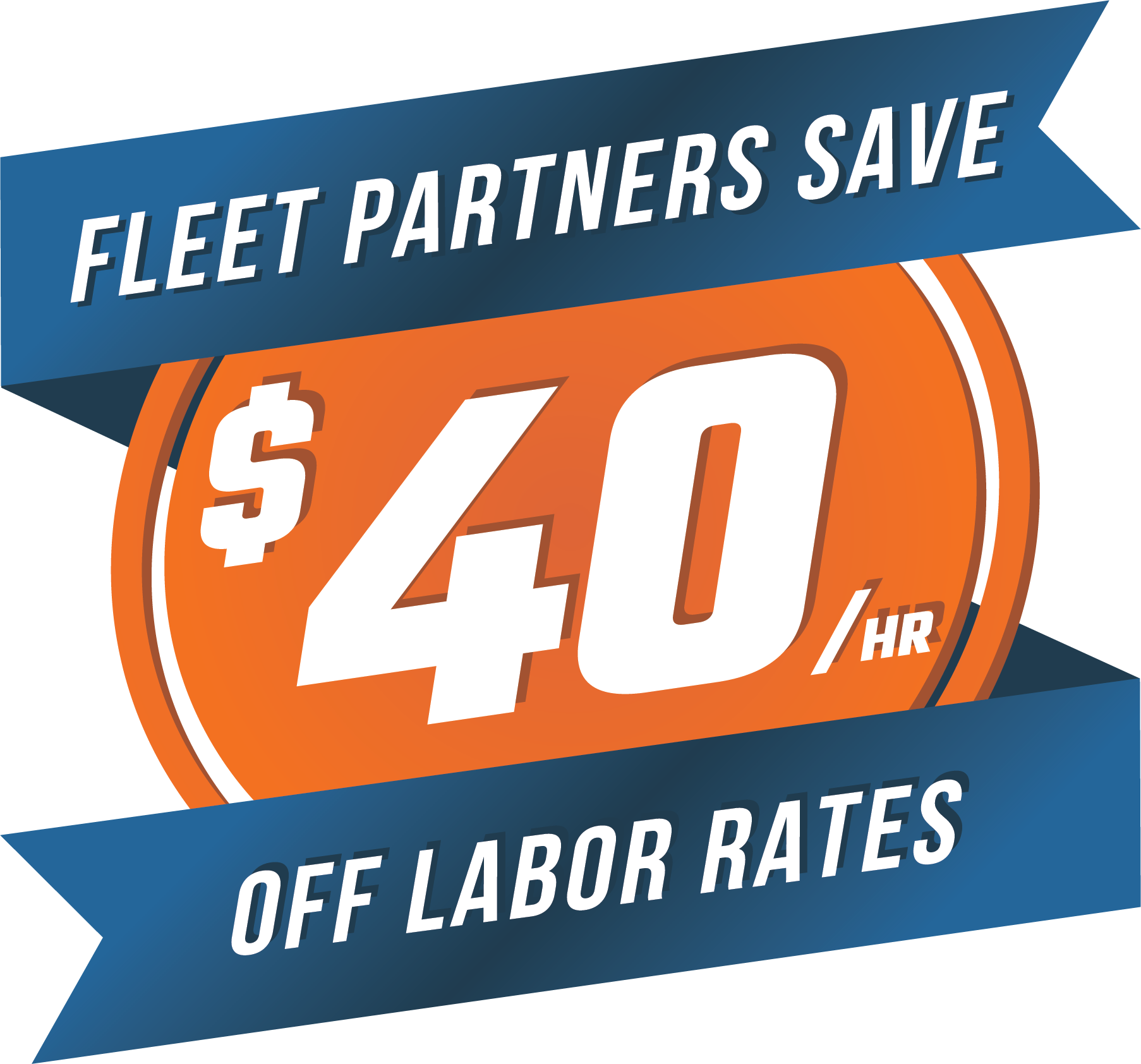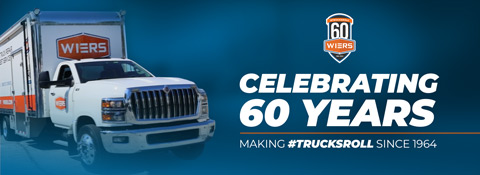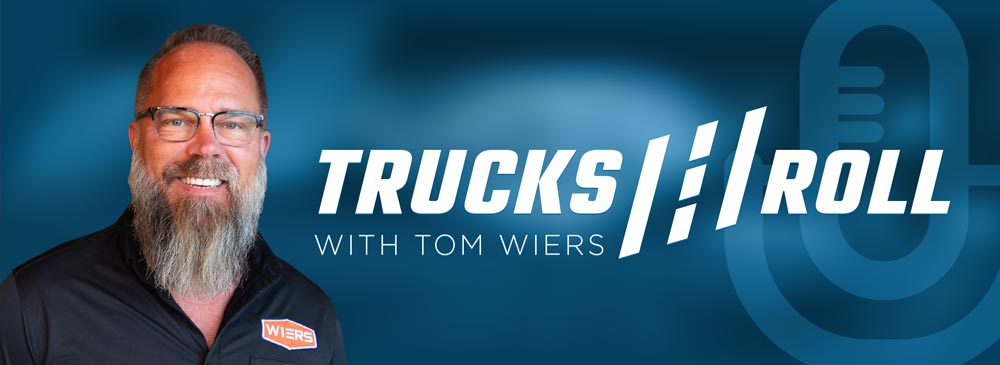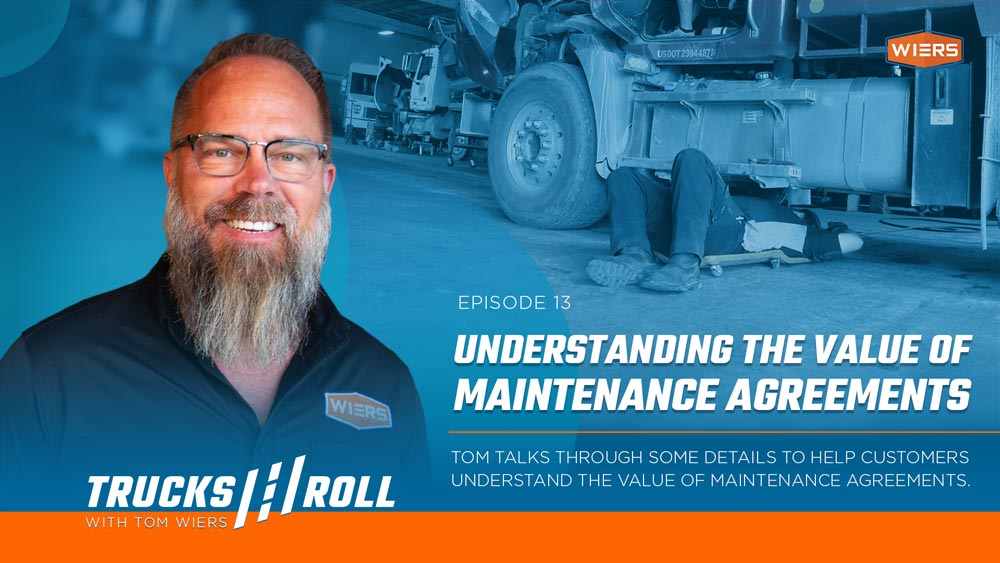
Understanding The Value of Maintenance Agreements – Trucks Roll, Ep. 13
A look behind the curtain of maintenance agreements.
In this week’s installment of the Trucks Roll Podcast, Tom shares some detail to help customers understand the value of maintenance agreements and how Wiers Fleet Partnership Plans work.
In this episode you’ll learn:
- Pros and cons of Maintenance Agreements
- How the pricing structure of a maintenance agreement works
- How Wiers Fleet Partnership Plans put the power in your hands.
Learn More About a Wiers Fleet Partnership Plan and find out how Wiers can help your trucks roll.
Here is the transcript for Trucks Roll Ep. 13:
The way to think about a labor rate is a triangle like a pyramid. At the bottom, the bottom portion, the biggest portion is going is actually going to pay for the technician. The technician wages and benefits and such. The middle section is actually for the overhead of the business and all the things that are cost to operate a maintenance facility on a month to month basis. At the very top of the pyramid is really the profit.
Hi and welcome to Trucks Roll Podcast. I’m Tom Wiers. And today I want to talk to you about maintenance agreements. This is a topic that comes up with our customers wanting to know if they should or shouldn’t take advantage of those. What are the pros and cons and some of the terminology and such? I’d like to cover that today.
First off, maintenance agreements are often called different things by different people. Contract maintenance is a term guaranteed. Maintenance is a term, whereas we like to use the term fleet partnership agreements. But essentially what you’re doing is you’re entering into some sort of agreement with a provider, with some structure to provide typically maintenance and repair for a piece of equipment.
So let’s go through the pros and cons.
One of the one of the pros about a. Agreement of some sort of maintenance agreement is that generally you’re going to be dealing with a more sophisticated provider who’s offering a maintenance agreement in the first place. So there’s a level of sophistication and professionalism when you’re dealing with companies and talking about maintenance agreements that you may not find at other smaller organizations. And that’s important because it deals with tracking, tracking abilities, measuring preventive maintenance cycles and all those sorts of things that are really important behind the scenes but don’t necessarily pop out when you’re thinking about this topic.
Maintenance agreements provide a lot of structure when they’re in place, and what we see, especially with a lot of smaller fleets, is they’re in there in a business doing something, whether it’s delivering building materials or shuttling people from place to place, whatever the business may be. That’s what they’re focused on. And oftentimes they don’t have the staff to, you know, scheduling the equipment, understanding what the maintenance intervals are. Oftentimes, fleets we deal with have different types of equipments.
They’re operating on different duty cycles. So there’s a lot of complexity that compounds very quickly. And a maintenance agreement with the provider can provide a lot of structure. So that’s a that’s a positive.
Second, I think very positive thing about a maintenance agreement is it provides discipline. And I guess one way to think about that is, you know, somebody if you have a workout coach or somebody a trainer, if you will, they bring a level of discipline to the workout regimen that a lot of people are unable to achieve on their own.
So you’ve gotta show up at a certain time. They’re going to run you through a specific workout. You’re going to leave at a specific amount of time after a specific amount of time. So those are very important. They bring a lot of discipline. And the same is true with a maintenance agreement. There’s structure, there’s discipline that go along with bringing your trucks in on a on a on a on a predefined schedule and making sure that the preventive maintenance is being done. If you’re struggling with your preventive maintenance, if you’re having a lot of breakdowns, then certainly those are red flags and those are probably an indication of maintenance agreement of some sort might be worthwhile for you.
You also, by having a maintenance agreement, have access. In today’s day and age where there are shortages and labor, skilled labor. Having a good provider, knowing that you have access to a team of experts is terribly important. And certainly maintenance agreements, oftentimes those customers are prioritized over. Perhaps customers are on a timer material and there’s no agreement in place. So access is important. And I believe honestly that’s going to become more important in the future as the skilled labor shortages continue to grow and manifest.
And then, as I said, a little bit touch based on team of experts. You know, when you have these agreements in place, you’re dealing with sophisticated company you can rely on and outsource, if you will, your fleet maintenance and capabilities. And you can get a team to help you run that part of your business without having to bring it inside, which is very expensive and it takes a lot of focus away from the core business. So those are some of the pros about a maintenance agreement.
Now, what are some of the cons? I think a big con, or at least a perception is that they are expensive, that you’re paying a premium for all of these services.
And I would I would argue that’s not the case. There’s a tremendous amount of value being brought, as I as I shared the pros with you. And, yes, you are going to pay for that. But those costs are spread out over typically a large customer base with a lot of units. So you’re going to pay your fair share, but it’s not going to be, in my opinion, an excessive amount.
A couple of other things that when people think about maintenance agreements is one of the negatives is commitment. So maintenance agreements are often a year or two years, three years in length. Sometimes they have out provisions, sometimes they do not, but you are committing to a provider. If you do not do the due diligence on the front side, if you don’t know who you’re entering into a relationship with, it may turn out poorly.
For example, if you enter into an agreement and there’s a lot of turnover at that location, the people that you started to deal with and wrote the agreement with thinking they were going to do your work may be gone, and you’re dealing with dealing with new personalities that may or may not match your culture and your business needs. So there are some you know, there are some things to consider in that in that area. But all in all, you know, typically those can be managed mitigated.
Signing a maintenance agreement doesn’t mean you walk away and turn everything over. There is still involvement by the owners of the equipment. You have to manage those like you would any vendor, or you’d have to manage that like you would an employee for that matter.
So let’s talk a little bit about how do maintenance agreements work?
Well, generally speaking, if you’re doing on time and material, you’re going to pay a labor rate. And what the way to think about a labor rate is it like is a triangle like a pyramid at the bottom, the bottom portion, the biggest portion is going that labor rate is actually going to pay for the technician, the technician wages and benefits and such. The middle section is actually for the overhead of the business, so it’s paying for rent and utilities and property taxes and all the things that are cost to operate the maintenance facility on a month to month basis.
At the very top of the pyramid is really the profit. So that’s the profit that the providers are, are are making in the agreement. On a labor sort of time of material relationship. The way I think about it, it’s kind of a win/lose us versus them business arrangement as a provider. The more you charge the customer, the more profit you’re going to make, the more revenue you’re going to make and your business is going to be a benefit as a result.
The flip side is the customer, as they’re as the bill is going up, not only are they having to pay a higher, you know, pay the the invoice, but they also have increased downtime. So every day that vehicles down is less productivity. Maybe they have to rent, maybe they’re missing customer deliveries, whatever the case may be. There’s a tremendous amount of cost, as we all know, of having trucks down. So one, one one basis for a maintenance agreement is getting rid of that traditional time and material relationship, that win/lose relationship in some instances and go to a more shared kind of win/win agreement.
And what I mean by that is, as I said, that most agreements have a fixed charge, which is a monthly reoccurring charge, and then there’s a variable charge. So let’s say, for example, a maintenance agreement is $200 a month and it could be a mileage charge, $0.10 a mile. So you’re paying that $200 a month. Generally speaking, that’s the top portion of the labor rate. That’s the profit and the overhead for that provider.
The mileage charge, let’s say $0.10 a mile. You’re running 2000 miles in a month. So that’s $200 that is really paying for the technicians wages. That’s the way to think about it.
Generally speaking, parts will be on top of that, or they could be embedded. But we’re seeing less of that in the industry because as we all know, the cost of parts is going up. It’s very, very difficult for a provider to forecast and predict what the costs are going to be of parts, you know, even months from now, let alone a year or a couple of years down the road. So we’re definitely seeing a trend where parts are being passed on to customers at some cost plus basis.
So, again, fixed charge plus a variable rate. The other way to do that, if you’re not charging, are not being charged a mileage charge. $0.10 a mile, as in my example, it could be charged a labor rate. So the labor it could be, you know, as low as, let’s say, $50 an hour or it could be $75 an hour, 100 or 150, whatever it is. And really that labor rate, the lower the labor rate, the more money that’s being shifted to the fixed cost.
So if it’s $200 and $120 an hour, if you want a lower labor rate, let’s say you don’t you don’t want to pay 120. You want to pay 50. Well, then 200 might become $350 a month fixed charge. So you’re basically moving money in the equation so that the provider can get the revenue he needs and the customer can kind of get the structure that they’re looking for. So that’s, you know, the basic programs and the charging formulas behind maintenance agreements.
Now, as I mentioned in my opening remarks, we call our programs at Weirs, Fleet Partnership Agreements. And really what we’ve taken is we’ve taken the maintenance agreement template and tried to make it more flexible in eliminating the cons that I described earlier.
So many of our programs require no long term agreement, in fact, as little as 30 days to cancel. So we think of it as more of a Netflix situation. Easy to sign up, easy getting rolled, easy to get started. And then it’s up to our company to win the. Business each and every month. So by providing the proper amount of communication, by ensuring quality repairs, by getting trucks in and out timely, we know those are the key factors that help customers operate their business and they will continue to come back to us.
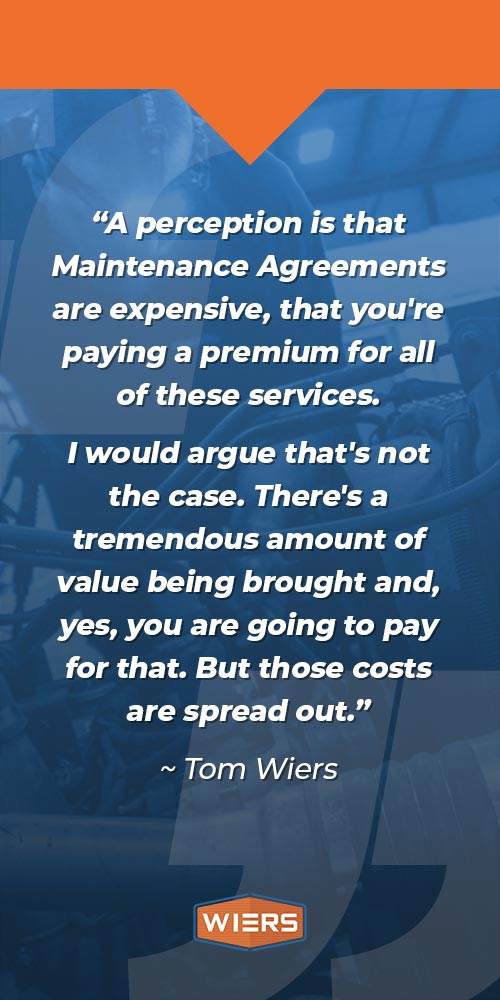
So again, our our fleet partnership programs are essentially a maintenance agreement, but they’re bundled in a more flexible manner that allows our customers to to be nimble and such. So those are really, you know, my thoughts about a maintenance agreement. Whether or not they’re right for you is is, you know, something that you have to do an analysis on. Certainly at Wiers we’re happy to have conversations with you and talk through those. Not all customers are good fits. Many are. And we’re happy again. So to walk you through that and help you make a decision.
And if we have that opportunity in your business, then we’re going to work hard to make sure your trucks are on the road, as we call it. We’re structural because that’s how our customers are making money. So I hope you enjoyed a little bit of background and knowledge about maintenance agreements. And please go to Wiers.com if you’d like to learn more and appreciate your time today.
Links:
- Share your thoughts and connect with us on Facebook
- Check out more videos on Youtube
- Listen to Previous Episode
